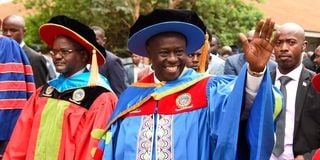DP Gachagua to universities: Scrap ‘outdated’ courses

Deputy President Rigathi Gachagua during a joint graduation ceremony at JKUAT on June 23, 2023. He challenged the graduating class and institutions of higher learning to take research and innovation seriously to solve unemployment.
Deputy President Rigathi Gachagua yesterday hinted at an imminent radical scrapping of some university programmes that he termed outdated amid shrinking white-collar jobs.
This could lead to hundreds of job losses as universities struggle to keep up with the fast-changing needs of the workplace, accelerated by technology, with the education system often seen as too slow to adapt. Mr Gachagua spoke at the Jomo Kenyatta University of Agriculture and Technology (JKUAT), where he was the guest of honour alongside Education Cabinet Secretary Ezekiel Machogu, as 4,299 students graduated during a joint ceremony between JKUAT and the Pan African University Institute for Basic Sciences, Technology and Innovation. This was JKUAT’s 40th graduation ceremony.
“We need to further evaluate the impact of the programmes offered by our universities beyond the prestigious courses. For example, it is no secret that white-collar jobs are shrinking every year. With an unemployment rate of over 60 per cent, graduates are not ripe to create jobs for themselves, ” said Mr Gachagua.
“Studies have shown that over 80 per cent of retired people are looking for work again. With knowledge but almost no experience, fresh graduates cannot compete favourably.”
Self-reliance
He reiterated that there is an obvious need for higher education institutions to adopt learning models that seek to produce innovative graduates who can create jobs and become self-reliant, instead of focusing on numbers.
“Tertiary institutions must also adapt and adopt their educational model to not only meet the demands of the new system but also support job creation. Tertiary education can no longer be about the number of graduates or the prestige of their degrees, but about the overall impact of their products—students. This is why there is an urgent need to review existing curricula with a view to retooling and reorienting them to meet today's needs.”
Mr Gachagua's statement comes less than four months after Egerton University scrapped eight courses and sent home over 200 staff members as the university struggles to survive amid a financial crisis. The discontinued programmes, said Egerton Vice-Chancellor Isaac Kibwage, had failed to attract enrolments.
They were Bachelor of Industrial Technology; Bachelor of Technology in Civil Engineering; Bachelor of Science in Soil, Environment and Land Use Management; Bachelor of Science in Dairy Technology and Management; Bachelor of Science in Wildlife Management and Enterprise; Bachelor of Science in Integrated Forest Resource Management; Bachelor of Science in Dairy Land Resources Management; and Bachelor of Science in Applied Aquatic Science.
The Deputy President urged tertiary institutions to foster local and international partnerships that can accelerate research and innovation for prosperity.
For her part, JKUAT Vice-Chancellor Victoria Ngumi said they are implementing a number of multidisciplinary research projects that would complement government efforts towards food and nutrition sustainability. Prof Ngumi cited the Belgian-funded legume project, which promotes climate-smart, high-yielding and nutritious bean varieties and bean-based products.
Kenya doesn’t perform well in a country ranking by World Bank based on individual match rates between worker education and job-required education.





